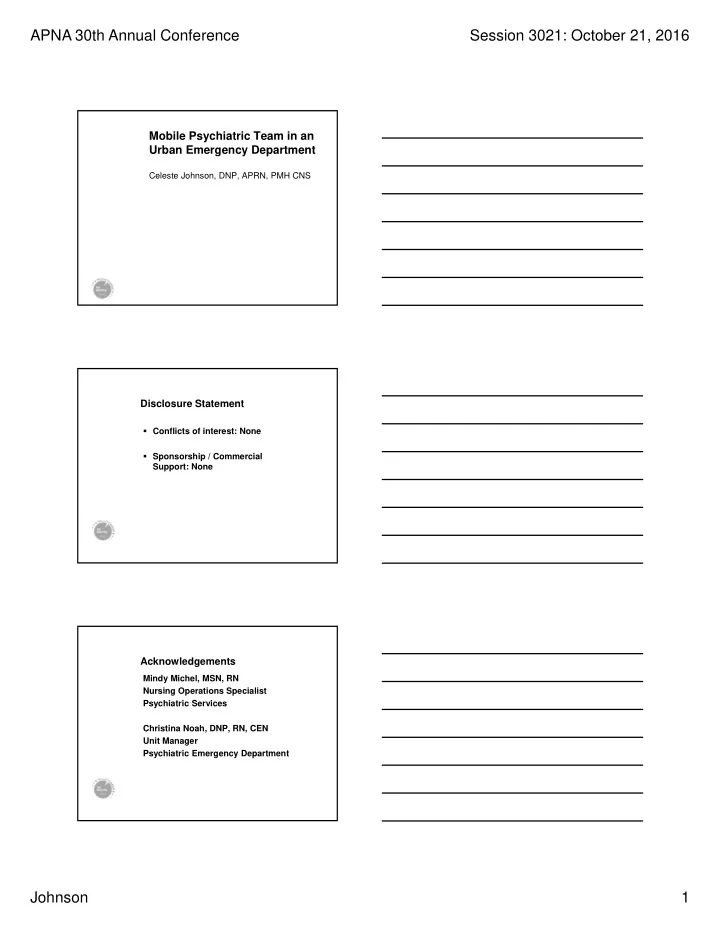

APNA 30th Annual Conference Session 3021: October 21, 2016 Mobile Psychiatric Team in an Urban Emergency Department Celeste Johnson, DNP, APRN, PMH CNS Disclosure Statement Conflicts of interest: None Sponsorship / Commercial Support: None Acknowledgements Mindy Michel, MSN, RN Nursing Operations Specialist Psychiatric Services Christina Noah, DNP, RN, CEN Unit Manager Psychiatric Emergency Department Johnson 1
APNA 30th Annual Conference Session 3021: October 21, 2016 Learning Outcomes • Describe the challenges of caring for patients with mental health complaints in an acute ED. • Discuss the importance of mental health professionals in the ED setting. Learning Outcomes • Describe the importance of a multidisciplinary triage team. • Describe positive patient outcomes after implementation of a multidisciplinary psychiatric triage team. Significance Patients with mental illness often present to the emergency department with needs varying from medication refills to inpatient admission. Johnson 2
APNA 30th Annual Conference Session 3021: October 21, 2016 Challenges Challenges Psychiatric Emergency Department Volume Situation • Increased agitation • Loud noises • Numerous overhead messages • Lack of privacy • NOT a therapeutic environment for patients experiencing psychiatric emergency (Innes, et al.,2013). • Research proves: ED overcrowding = increased morbidity and mortality (Collis, 2010). Johnson 3
APNA 30th Annual Conference Session 3021: October 21, 2016 Strategic Plan • Presence of multidisciplinary mental health team members in the ED • Positively impacts patient care (Innes et al., 2014). • When a multidisciplinary method was implemented for patients with mental illness • ED staff recognized better care for patients • Increased staff satisfaction (Innes et al., 2014). Background • Psych consult service to the ED since 2012 • Focus was on voluntary and “easy to clear” patients • Patients under emergency detention waited until there was room in the Psych ED • Adverse event in September 2015 • Identified need to see the most acute patients sooner Strategic Plan • Developed a multidisciplinary triage team • Physician • Nurse Practitioner/Physician Assistant • Psychiatry RN • Psychiatry Social Worker • ER staff “level” patients as STAT, urgent, or routine. • Psychiatry team responds based on clinical acuity Johnson 4
APNA 30th Annual Conference Session 3021: October 21, 2016 Outcomes Outcomes Johnson 5
APNA 30th Annual Conference Session 3021: October 21, 2016 Lessons Learned • Continuous need for education in first 1-3 months • Need for critical EMR updates identified • Whether to reclassify acuity levels • Activation “fall-out” evaluations • ED recidivism- “high utilizers” • Individualized behavior plans • Community connections QUESTIONS? Johnson 6
Recommend
More recommend